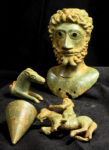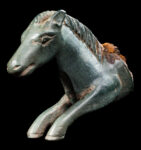 The nationally important hoard of votive bronzes including a bust of Emperor Marcus Aurelius that fell through the loophole in the Treasure Act and were sold at auction earlier this year have been acquired by the Yorkshire Museum. Discovered in 2020 by two metal detectorists near the village of Ampleforth, North Yorkshire, the collection of bronzes includes an equestrian statuette of a local iteration of the god Mars, a knife handle shaped like the forequarters of a horse, a large plumb bob and a finely-modeled bust of Marcus Aurelius six inches high. They date to the late 2nd century.
The nationally important hoard of votive bronzes including a bust of Emperor Marcus Aurelius that fell through the loophole in the Treasure Act and were sold at auction earlier this year have been acquired by the Yorkshire Museum. Discovered in 2020 by two metal detectorists near the village of Ampleforth, North Yorkshire, the collection of bronzes includes an equestrian statuette of a local iteration of the god Mars, a knife handle shaped like the forequarters of a horse, a large plumb bob and a finely-modeled bust of Marcus Aurelius six inches high. They date to the late 2nd century.
Most remarkable is the striking bust of Antonine emperor Marcus Aurelius. This would have sat atop a sceptre or priestly staff, a focal point for religious ceremonies. Being the face of the emperor, it is a potent symbol of the Imperial Cult, the empire-wide worship of emperors as divine. Such direct evidence of the imperial cult is exceedingly rare, especially in rural settings like this. In terms of its execution and style the bust is absolutely unique, exceedingly rare and of great national significance in its own right.
The three objects found alongside the bust help to add context to the burial of this spectacular object. The beautifully detailed horse and rider figure, a localised depiction of the god Mars, is of a type that has never been found this far north. The knife handle in the form of a horse, may symbolically represent a sacrificial animal in this context. The plumb bob is a large and fine example of a functional object used in Roman engineering projects. Its inclusion within the hoard is unparalleled in Roman Britain and hints at the focus of this enigmatic ritual being the blessing of an act of landscape engineering.
 When the assemblage was sold to an unknown buyer for £185,000 ($260,000) in May 2021, I expressed a forlorn hope that the buyer would turn out to be a museum or a generous donor thereto. It was neither. The buyer was antiquities dealer David Aaron, but a generous donor did materialize to save the day. Richard Beleson of San Francisco, a great friend of the Yorkshire Museum who supported them in their acquisition of the Wold Newton Roman coin hoard in 2017, went to the bat for them again. With additional contributions from the Art Fund and other private donors, the museum was able to secure this exceptional treasure that is so uniquely significant to the history of Yorkshire.
When the assemblage was sold to an unknown buyer for £185,000 ($260,000) in May 2021, I expressed a forlorn hope that the buyer would turn out to be a museum or a generous donor thereto. It was neither. The buyer was antiquities dealer David Aaron, but a generous donor did materialize to save the day. Richard Beleson of San Francisco, a great friend of the Yorkshire Museum who supported them in their acquisition of the Wold Newton Roman coin hoard in 2017, went to the bat for them again. With additional contributions from the Art Fund and other private donors, the museum was able to secure this exceptional treasure that is so uniquely significant to the history of Yorkshire.
The hoard was discovered in the Ampleforth area of Ryedale district, North Yorkshire, England. Before the discovery of this hoard, the presence of the Romans in this area was little known. This find therefore rewrites the history of our region. The situation of this discovery, with detailed and reliable provenance information, makes the hoard even more significant.
The hoard is on display this week at the Frieze Masters in London. It will then make a permanent move to York where it will be exhibited in the Yorkshire Museum’s Roman collection when the museum reopens in 2022.
I was disappointed when Tullie House was outbid for the Crosby-Garrett helmet ten years ago, and I did not want to see the Ryedale Ritual Bronzes suffer the same fate. I believe in leading by example. I call on the owner of the Crosy-Garrett helmet to donate it to Tullie House.
“plata por plomada” :notworthy:
Two additional comments
Parliament such enact and sign the legislation that would close the loophole in the PAS. If an object is of non-precious metal but of immense historical or cultural value, it should qualify as treasure…
Thank you to David Aaron Antiquities for working with the Museum and agreeing to sell the bronzes to the Museum. It was a wonderful goodwill gesture.
Richard Beleson:
Thank you for your generosity and interest in the Yorkshire Museum and these objects. It is this kind of grass roots philanthropy that is essential in preserving history and educating folk about the past.
I was also pleasantly surprised to discover that you are another reader of this blog.
Again, thank you.
Dear United Kingdom,
Please stop being nauseatingly hypocritical and return the Parthenon marbles back to Greece.
I believe they should, Tristram, but I also believe one should look closer to home first.
Dear Tristram.
You can legitimately take a view that the marbles should be returned to Greece but why are you only jumping on that bandwagon? Where’s your righteous indignation at the treasure looted by Napoleon from Italy now glittering in the Louvre? Why are Italians not “nauseating” you by retaining the Venetian loot of Constantinople now in Venice. Why only Elgin, who at least had the decency to ask the controlling power and paid for the stuff. There’s nothing more nauseating than those who unthinkingly and pompously jump on bandwagons, dear Tristram.
Hee hee! Obviously pricked some consciences! I am jumping on no bandwagons. How can you blubber about some Roman gewgaws found in England and not be determined to return items found on the one structure that everybody on the planet associates with ancient Greece. You suck!!!
No Tristram. Just pointing out your childish paint by numbers view of the world. Keep watching the History Channel, it’s clearly about as sophisticated as you can cope with
I love it! Miles praises Elgin as a canny British imperialist who bargained with Turkish imperialists over the spoils of a helpless Greece who had absolutely zero say in the matter. Undoubtedly the Greeks wanted you to keep them in perpetuity. And now they quake with fear that any dug up historical object leaving Britain would represent an irreparable loss to their heritage? Yes, the hypocrisy is nauseating! Give the Parthenon marbles back to Greece!